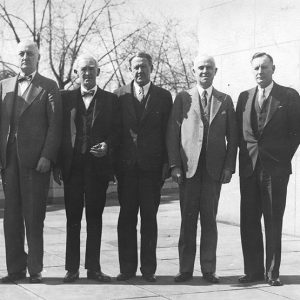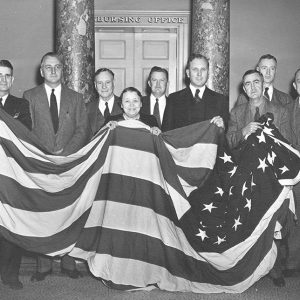calsfoundation@cals.org
William Fadjo Cravens (1899–1974)
William Fadjo Cravens was a Democratic member of the U.S. House of Representatives. He represented the Fourth District of Arkansas in the Seventy-Sixth through the Eightieth Congresses, serving from 1939 to 1949.
Fadjo Cravens was born in Fort Smith (Sebastian County) on February 15, 1899, to William Ben Cravens and Caroline Dyal Cravens. Cravens got his early education in the local public schools before attending the University of Arkansas (UA) in Fayetteville (Washington County) and the University of Pittsburgh.
His education was interrupted while he served as a seaman in the U.S. Navy during World War I. Upon his return from the service, he earned his law degree from Washington and Lee University in Lexington, Virginia, in 1920.
Cravens was admitted to the bar that same year and began to practice law with his father in the firm of Cravens, Cravens and Friedman. As his father had before him, Cravens served as city attorney for Fort Smith. During his decade as city attorney, he also built a prosperous private practice.
Cravens’s father, Ben Cravens, was a Democratic member of the U.S. House of Representatives, serving from 1907 to 1913 and again from 1933 until his death in 1939. Despite family tradition, Cravens was not actively involved in partisan politics beyond supporting his father during his many years of congressional service. However, when Ben Cravens died suddenly in 1939, Cravens won the special election to fill the vacancy caused by his father’s death. He was reelected to four full terms of his own before he retired.
During his tenure in Congress, Cravens served on the Judiciary Committee as well as the Committee on Irrigation and Reclamation, the Committee on Mines and Mining, and the Committee on Territories. In 1940, Cravens was named as a delegate to the Democratic National Convention. While his father had generally supported Franklin D. Roosevelt and the New Deal, by the time Cravens arrived in Washington, the New Deal was on its last legs, and Roosevelt was transitioning from focusing on the New Deal to focusing on winning the war. Indeed, with the onset of World War II, Cravens and his colleagues in the Arkansas worked hard to secure some of the government’s massive military and defense spending for their areas. Despite his low seniority, as well as the state’s overwhelming agricultural orientation, major defense and munitions facilities were established in a number of Fourth District communities, including Camden (Ouachita County) and Pine Bluff (Jefferson County).
Choosing not to run for reelection in 1948, Cravens left the nation’s capital and returned home to Arkansas. Back in Fort Smith with his wife, Elizabeth Echols Cravens, and their son, William Fadjo Cravens Jr., Cravens resumed his law practice, while also serving as the vice president and marketing director of Fort Smith’s Merchants National Bank.
Cravens died in Fort Smith on April 16, 1974. He is interred in Forest Park in Fort Smith.
For additional information:
“Fadjo Cravens, Ex-Lawmaker, Dies at Age 75.” Arkansas Gazette, April 20, 1974, p. 14A.
“William Fadjo Cravens.” Biographical Directory of the United States Congress. http://bioguide.congress.gov/scripts/biodisplay.pl?index=C000887 (accessed December 5, 2014).
William H. Pruden III
Ravenscroft School
 Congressional Delegation, 1934
Congressional Delegation, 1934  Cravens Senate Card
Cravens Senate Card  Senators and Representative: 1938
Senators and Representative: 1938 




Comments
No comments on this entry yet.